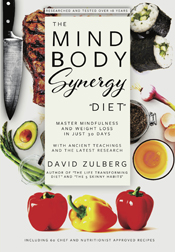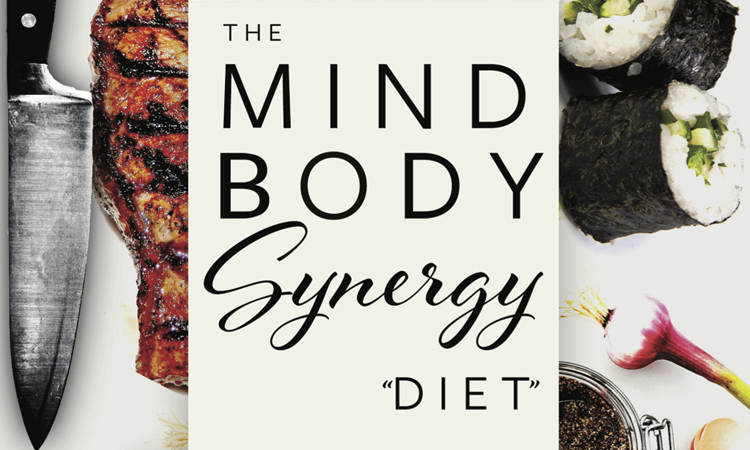Enlightening excerpt from David Zulberg’s new book
Do you know the real reason why most diets fail? They focus solely on physical changes like diet and exercise, almost always ignoring the mental and emotional changes that also need to be made. The mind-body connection contributes more to weight gain and weight loss than many of us realize.
Think about it: Food cravings start in the mind. Your body became accustomed to the donut with your coffee in the morning and the chips in front of the television after dinner. Overeating is a learned behavior; a mental habit that becomes strengthened over time.
 The good news is you can rewire your brain to make healthier choices. In David Zulberg’s new book, Mind Body Synergy, he identifies fundamental principles in both ancient wisdom and modern science, and how you can apply these principles to improve both your mental and physical health. Zulberg writes in a relatable, conversational tone, and it’s obvious he is rooting for you to succeed; making you feel like he is right there with you every step of the way on your weight loss journey.
The good news is you can rewire your brain to make healthier choices. In David Zulberg’s new book, Mind Body Synergy, he identifies fundamental principles in both ancient wisdom and modern science, and how you can apply these principles to improve both your mental and physical health. Zulberg writes in a relatable, conversational tone, and it’s obvious he is rooting for you to succeed; making you feel like he is right there with you every step of the way on your weight loss journey.
The key to weight-loss is restoring your body’s natural instincts. In this excerpt, Zulberg shares six tips for re-learning how to only eat when you’re hungry, only drink when you’re thirsty, and how to beat cravings.
CRAVINGS VS. HUNGER
Since your body has been trained – through bad habits- to ignore its own cues, how can you tell the difference between cravings and hunger?
This is an interesting insight taught by the Master Physicians: When you’re hungry, you’ll want any type of food.
When you experience a craving, it’s for a specific food. Why? When you’re truly hungry, you need food to satisfy that hunger. It’s a natural calling, and any type of food will satisfy that physiological requirement. After that goal has been accomplished — your natural hunger has been satisfied- you will no longer need to eat. That’s why an animal or a three-year-old child instinctively stops eating when satiated. In contrast, cravings and overeating aren’t instinctive. You don’t need that specific food you crave. Cravings and overeating are learned behaviors, shaped over time through the intricate mechanisms of habit formation. There is no logical limit and you will only stop after you have satisfied that craving or feel sick to your stomach.
Here are six tips and insights for re-learning how to only eat when you’re hungry and only drink when you’re thirsty, and to beat cravings once and for all. I will explain throughout the book how you can implement these tips in a practical and easy way:
- Between-meal snacks: Drink first and opt for healthier foods.
Before you eat anything between meals, first drink something — preferably 1-2 glasses of water. You often ignore your natural urge to drink water, opting for food instead. But remember: no amount of food can quench your thirst. If you quench your thirst between meals and still feel hungry 10-20 minutes later, fight the urge to eat junk food just because it’s within reach. Opt for yogurt, vegetables or fresh fruit. Not only will these options add nutrients to your diet, they’ll keep you fuller longer than a bag of chips or a candy bar. Once you have integrated new healthy eating habits, you can introduce other snack options within certain guidelines like cookies, bars and ices. I have some delicious options in the recipes section.
- Make your home craving-free.
If the source of a craving is removed, you’re less likely to be aroused by it. This is especially true for those who spend a large part of the day in the house and more specifically, the kitchen. At home, the nibbling can go on endlessly. Try not to bring home products you know you shouldn’t eat. If you feel the need to keep some less-healthy snacks at home, keep the serving sizes small.
- Limit food choices at your main meal of the day.
When you sit down to a table laden with lots of different foods, it’s so easy to overeat. A review of 39 human and animal studies found that food consumption increases when a meal has more variety, and is associated with increased body weight and fat.
- Add vegetables to your meals.
When you think of dieting, you think about eliminating food choices or food groups. Instead think about adding! Simply add more vegetables. High in fiber, vegetables leave you feeling full and not craving more. Even if your appetite is over-stimulated at a meal, especially when including starches at a meal, it’ll be hard to overeat if it’s full of nutritious vegetables.
- Three large meals a day?
You have been trained to believe that you ‘need’ 3 large meals a day, as well as snacks between meals. Many people overdo snacking as well, so it can add up to 4 or 5 large meals a day. It is no wonder that obesity statistics have sky rocketed! The ancients taught that your body doesn’t need more than two large meals a day. Try a lighter meal for your third meal or skip it entirely.
- Mindfulness is your most powerful tool
Sure you often hear the term ‘mindfulness’ today but you need to learn how to practically implement this ancient and scientifically proven method for balancing your emotions and perceptions. Mindfulness can also be applied to your eating habits, which results in weight loss and perhaps more importantly, the enjoyment and appreciation of the moment, while you eat. I will suggest mindfulness tips that are based on extensive ancient and modern research. Some tips may seem obvious in theory but they are certainly challenging to implement in real time. I will show you how to apply all these suggestions in a practical and methodical way as you move through the book. But remember: the main goal of a health, psychological or weight loss program should be to restore your body’s natural rhythm by reinstating its natural integrity. Then you’ll only eat when you’re truly hungry. You will manage stress and life challenges effectively — because that’s what you should do naturally. Just like an animal or three-year-old child, your body will instinctively make the right choices.

Rose Caiola
Inspired. Rewired.
Reprinted from The Mind Body Synergy Diet by David Zulberg.


